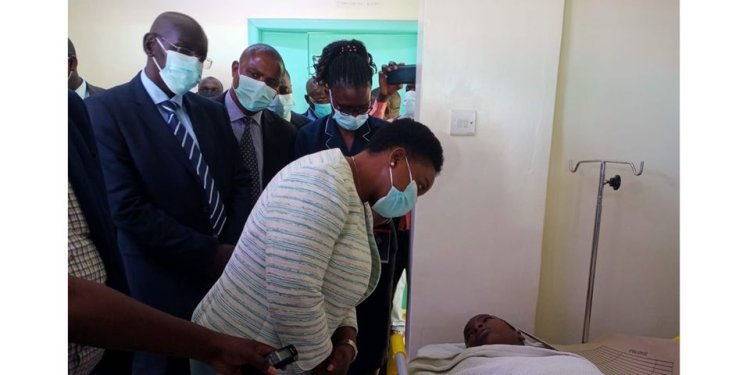Third Mukumu Girls School Student Dies
The student died while at the Intensive Care Unit (ICU) while undergoing treatment at the Kakamega County Hospital.

Mukumu Girls High School in Kakamega County has lost its third student a week after it was closed indefinitely in the wake of the deaths of two students in a case of suspected food and water poisoning.
The student died on Tuesday, April 11 while at the Intensive Care Unit (ICU) while undergoing treatment at the Kakamega County Hospital.
Kakamega County Health executive Bernard Wesonga, according to Nation.Africa, revealed that four girls remain hospitalised.

Health CS Susan Nakhumicha and Education PS Belio Kipsang visiting students from Sacred Heart Mukumu Girls High School who were admitted at the Kakamega County General Hospital. /DAILY NATION
The outbreak has since seen over 124 students hospitalised at the Kakamega County General Hospital following reports that more than 500 students were infected by the bacteria.
On Wednesday, April 5, the Kenya Medical Research Institute (KEMRI) revealed that the students suffered from a double infection of gastroenteritis and amoeba, with Health Cabinet Secretary (CS) Susan Nakhumicha however revealing that a student who was admitted to the Intensive Care Unit (ICU) improved and was moved to the general ward at the Kakamega Referral Hospital.
"We have a total of 108 cases of gastroenteritis, a stomach disease which has resulted in two deaths. A majority were managed as outpatients with 40 admitted," she stated.
Nonetheless, she announced that a multi-agency team had been tasked to oversee the overhaul of the school’s water infrastructure, kitchen, dining, and grain stores and expand the boarding section to avert the recurrence of water-borne diseases.
She added that even though the government was still carrying out laboratory investigation through organs such as the Government Chemist and the KEMRI, the team will address obvious water contamination at the school in Kakamega county.
"We will be working with the county governments to assess facilities on how they handle food and verify that the cooks are certified by the Ministry of Health," the CS pointed out.
The Health CS was in the company of Education Principal Secretary (PS) Belio Kipsang' as they toured the school on April 5, and identified five key problems that could have triggered the disease breakout.
School Principal Fridah Ndolo disclosed that the school sourced its water from a stream which was stored in an overhead tank. However, the team posed questions about the faulty water filter, the effectiveness of the chlorination process, and how often the tank was cleaned.
The school head revealed that the main tank is cleaned every three months. An official also backed her up by noting that the water sampled from the stream may at times be resistant to the chlorination process.
Kipsang, on the other hand, suggested that the Ministry of Water in partnership with the Ministry of Education drilled boreholes to ensure a constant supply of clean water.
Kakamega Senator Boni Khalwale had previously claimed grain contamination was the likely cause of the deaths and sickness at the school, insinuating that Nova, a poisonous organo-phosphate pesticide used in maize preservation was synonymous with symptoms exhibited by the girls.
The delegation also visited Butere Boys High School in Kakamega County which became the second school in the county in a matter of hours to be closed indefinitely.

Butere Boys High School. /TWITTER.MBAITU FM

 admin
admin 




